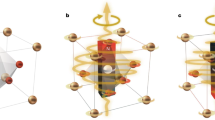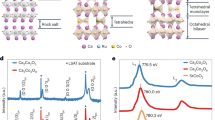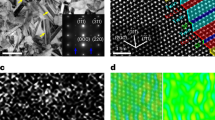Abstract
IN three earlier communications1, we described the magnetic, chemical and crystallographic properties of the ferromagnetic minerals causing self-reversal of thermo-remanent magnetization of igneous rocks. The results of studies of these properties showed that most grains of ferromagnetic minerals in the Haruna dacitic rocks consist of two different ferromagnetic constituents; one called A is titanium-poor titano-magnetite having a crystal structure of inverse spinel type and Curie point around 500° C.; another called B is a solid solution of ilmenite and hæmatite (hæmoilmenite) having rhombohedral crystal structure and Curie point of about 230° C.
This is a preview of subscription content, access via your institution
Access options
Subscribe to this journal
Receive 51 print issues and online access
$199.00 per year
only $3.90 per issue
Buy this article
- Purchase on Springer Link
- Instant access to full article PDF
Prices may be subject to local taxes which are calculated during checkout
Similar content being viewed by others
References
Nagata, T., Nature, 169, 704 (1951); 172, 850 (1953). Nagata, T., et al., Nature, 172, 630 (1953).
Néel, L., Ann. Geophys., 7, 90 (1951).
Author information
Authors and Affiliations
Rights and permissions
About this article
Cite this article
NAGATA, T., UYEDA, S. Interaction of Two Constituents in Ferromagnetic Materials showing Reverse Thermo-remanent Magnetism. Nature 175, 35–36 (1955). https://doi.org/10.1038/175035b0
Issue Date:
DOI: https://doi.org/10.1038/175035b0
This article is cited by
Comments
By submitting a comment you agree to abide by our Terms and Community Guidelines. If you find something abusive or that does not comply with our terms or guidelines please flag it as inappropriate.



